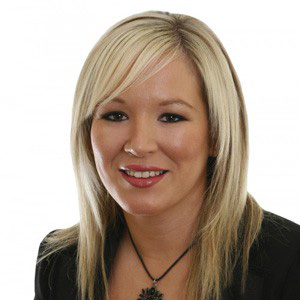
Health Minister Michelle O’Neill.
THE NORTH’S healthcare system is set to be transformed to ensure it survives.
Health Minister Michelle O’Neill launched a 10-year vision today to tackle a system which she has described as being “at breaking point”.
The plan, entitled Health and Wellbeing 2026, comes after a major report by a expert panel led by Professor Rafael Bengoa.
It was delivered to Ms O’Neill in June and is published for the first time today, along with the minister’s decade-long vision.
Professor Bengoa’s report, Systems, Not Structures: Changing Health and Social Care, includes 14 recommendations.
He said the healthcare system in Northern Ireland faces a “stark choice”.
“It can either resist change and see services deteriorate to the point of collapse over time.
“Or embrace transformation and work to create a modern sustainable service that is properly equipped to help people stay as healthy as possible and to provide them with the right type of care when they need it,” he said.
“We have tried to produce a report that will make a practical contribution to implementing change and which will support the minister’s ambitious, and wholly necessary, roadmap to reform.
“Transformation will not be simple, but the panel has no doubt that Northern Ireland has both the people and the energy to deliver a world class health and care system.”
The aims of the report, Delivering Together, include:
- A renewed focus on prevention and keeping people well
- Better capacity in primary care, based on substantial additional investment
- Reform of hospital services
- A renewed focus on partnership and co-design
The Bengoa Report is the third major report recommending a transformation of the health service in recent times following the Donaldson Report in 2014, and John Compton’s Transforming Your Care report in (2011) which recommended to closure of a number of smaller hospitals in Northern Ireland.
The health system in Northern Ireland “has not changed quickly enough to meet the demands and needs of the population”, Ms O’Neill told MLAs this morning.
“Our current delivery models have had negative impact on the quality of care. The current model is unsustainable.
“If we continue as we are now, the system in 10 years would need 90% of the entire Executive budget.”
The minister said the report did not offer “a quick fix”.
“We have an opportunity for a ‘fresh start’, supported by the Executive – not just the will of one minister or one department,” she said.
“There is total agreement across the Executive that this needs to be done. Changing the health system is the right thing to do, it’s the right time to do it and it is right for the people who use it.
“This change will be planned, managed, incremental- this is not a ‘Big Bang’.
“Meaningful change does not happen overnight- this will take time, money and the support of staff, those who use our health and social care services as well as the support of Government.”
Mrs O’Neill said that by early next year, a plan to tackle waiting lists would be drawn up. By Spring, there will be investment to to ensure every GP practice has a named district nurse, health visitor and social worker.
Further support for looked after children – children for whom the state has taken on parental responsibility – will be in place by late 2017, she said.
Tags:




